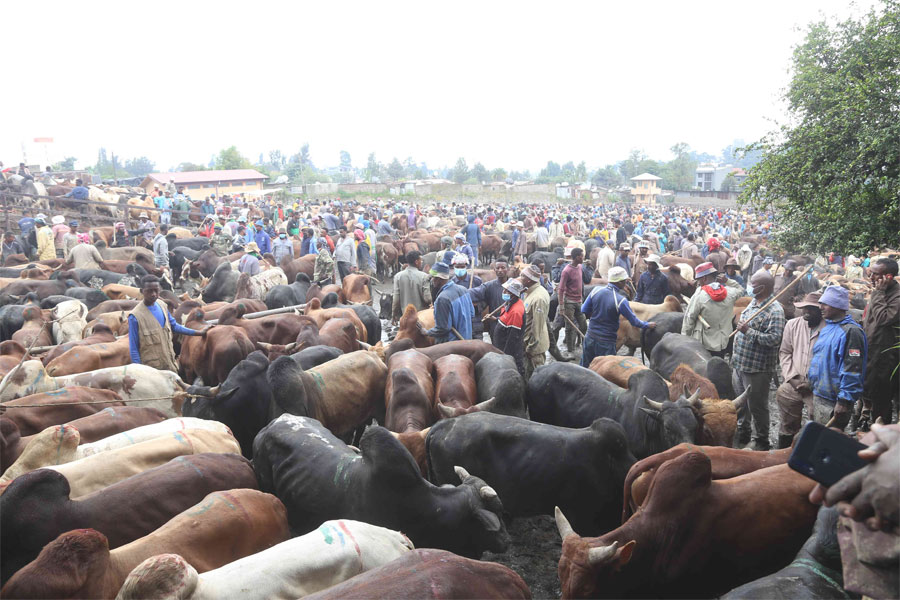
Fortune News | May 27,2023
The coffee industry has become the latest to be exempted from the freeze on collateralised loans the central bank imposed last month. The development coincides with the coffee harvest season, expected to attain 280,000tn of the cash crop this year for the export market.
The freeze order was initially intended to narrow the parallel and official exchange market gap, which reached a historic high of 50pc when the dollar was exchanged officially at 44 Br last month. However, authorities have since eased restrictions to enable commercial banks to process asset-based collateral loans to producers of edible oil and importers borrowing to settle letters of credit.
The coffee sector is the latest on the list of exemptions.
Effective September 8, 2021, the National Bank of Ethiopia (NBE) instructed all the commercial banks to provide loans to coffee growers and businesses involved in the value chain.
Dereje Zenebe, president of Zemen Bank, confirmed receiving the instruction from the central bank to process loans for coffee growers. So did Ermias Andarge, president of Enat Bank.
"We've received the notice through email," Ermias told Fortune.
The lifting of the restriction on the coffee market comes at the behest of the Ethiopian Coffee Growers, Producers & Exporters Association. The industry lobby group has been protesting the freeze since it first came into effect, informing the authorities that it is drying sources of cash for its members. It was particularly straining for coffee growers that were supposed to start harvesting earlier this month.
Coffee farms need loans to pay labourers, process and transport coffee beans and, the working capital would come in the form of collateralised loans.
"The restrictions have already affected 15pc of coffee crops in the country's southwestern regions," said Hussein Ambo (PhD), president of the Association, which has 150 members.
The loss is a major setback to industry players contributing over a quarter of the country's export proceeds with a target to produce 457,200tn of coffee this year. Coffee generated over 900 million dollars in export revenues last year, shipping 248,000tn, mainly to the United States, Europe and the Middle East. This year, the Coffee & Tea Authority targets earnings of a little over a billion dollars.
"The commercial banks need to approve the loans promptly to prevent any more loss," Hussein urged.
Fikadu Hailemariam, general manager of Homeland Organic Coffee Agro-Industry Plc, fears export this year will likely drop. His company was established 15 years ago and developed a 500ht farm in Bonga of the Southern Regional State. Its annual harvest reaches between 250tn and 300tn, deploying as many as 700 labourers during the August to December harvest seasons.
"We need three or four million Birr to cover the cost of labour every month," Fekadu told Fortune. "If we don't start soon, it'll lead to a lot of wastage."
Homeland earns up to 20 million Br annually from coffee export.
These loans are essential; otherwise, it will be a problem for the whole country, according to Worku Wake, developer of Dawi Coffee Plantation, established a decade ago. The company produces 500tn of coffee annually on its 400ht farm in the Shaka Zone of the Southern Regional State.
Alemayehu Geda, a professor of economics at Addis Abeba University, believes the coffee producers' dilemma results from poor preparation on the side of the central bank.
"There should have been discussions involving all parties before enacting the policy," said the Professor. "It shows the central bank is lacking in the research department."
Two weeks ago, in a rare appearance at the weekly briefing organised by the Office of the Prime Minister, Eyob Tekalign (PhD), a state minister for Finance, described the freeze as an acceptable trade-off, despite pledging to lift it soon.
PUBLISHED ON
Sep 10,2021 [ VOL
22 , NO
1115]

Radar | Dec 19,2021

Commentaries | May 15,2021

Commentaries | Apr 30,2022

Radar | Sep 18,2023

Radar | Jun 12,2023

Dec 22 , 2024 . By TIZITA SHEWAFERAW
Charged with transforming colossal state-owned enterprises into modern and competitiv...

Aug 18 , 2024 . By AKSAH ITALO
Although predictable Yonas Zerihun's job in the ride-hailing service is not immune to...

Jul 28 , 2024 . By TIZITA SHEWAFERAW
Unhabitual, perhaps too many, Samuel Gebreyohannes, 38, used to occasionally enjoy a couple of beers at breakfast. However, he recently swit...

Jul 13 , 2024 . By AKSAH ITALO
Investors who rely on tractors, trucks, and field vehicles for commuting, transporting commodities, and f...

Oct 18 , 2025
The political establishment, notably the ruling party and its top brass, has become p...

Oct 11 , 2025
Ladislas Farago, a roving Associated Press (AP) correspondent, arrived in Ethiopia in...

Oct 4 , 2025
Eyob Tekalegn (PhD) had been in the Governor's chair for only weeks when, on Septembe...

Sep 27 , 2025
Four years into an experiment with “shock therapy” in education, the national moo...